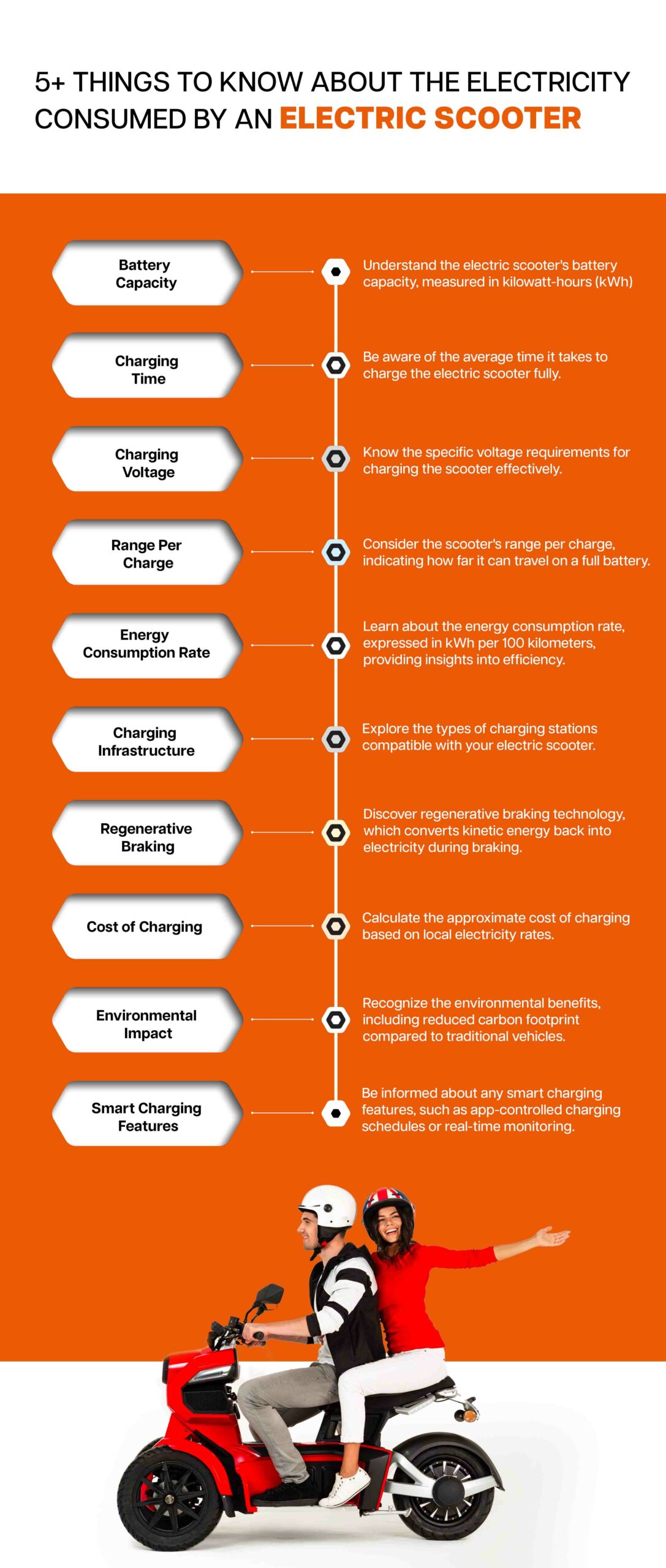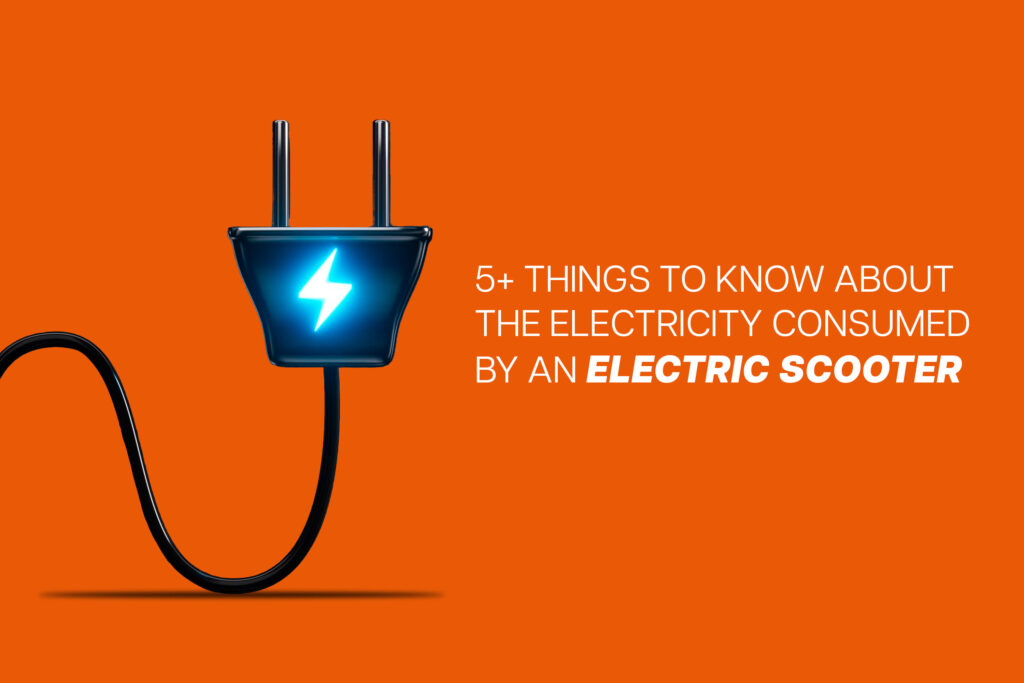Electric scooters are more commonly referred to as e-scooters. They have rapidly become a popular choice among riders and green transportation advocates as well. Electric scooters are silent and are highly efficient. While I travel to the office every day, I can see how people who use e-bikes are easily zipping through the city roads, Which brought me to the question, What would be the electricity Consumed by an electric scooter? After a thorough research on the lifecycle of an electric scooter, I learned a lot about the Power usage of electric scooters, the charging cost, and how the impact an electric vehicle has on the environment. Let’s look at them one by one.
How Much Electricity Does an Electric Scooter Consume?
When we talk about the electricity Consumed by an electric scooter, we need to keep in mind the factors that influence the use of the energy.

This might seem insignificant, but in the grand scheme of eco-friendly transportation energy, every watt counts.
Does Charging an Electric Scooter Cost Much to the Power Bill?
Charging an electric vehicle, including e-scooters, often raises questions about the additional cost to one’s electricity bill. The electric scooter price in terms of energy cost is surprisingly economical. To put it into perspective, if you’re charging your EV scooter overnight, the increase to your power bill is marginal compared to the cost of fueling a petrol-powered bike. As EV scooters have been evolving based on customer needs, the Charging efficiency for e-scooters has also rapidly improved with smart charging solutions for e-scooters which make them more cost-effective more of travel.

Therefore, charging an electric scooter does not significantly impact the power bill.

How Much Does It Cost to Run Electric Scooters per Kilometer and How to Calculate It?
Calculating the operational cost per kilometer of the Best electric scooter in India involves considering the electricity rate in your area and electricity Consumed by an electric scooter. You can calculate it by determining the electric scooter’s battery capacity (in kWh), multiplying it by your local electricity cost per kWh, and dividing the result by the electric scooter mileage factors per charge.
To calculate the cost of running an electric scooter per kilometer, you can follow these steps:
-
Determine the energy consumption per kilometer:
This is typically provided in terms of watt-hours per kilometer (Wh/km) or kilowatt-hours per kilometer (kWh/km). You can find this information in the scooter's specifications or manual. Let's denote this value as E (in kWh/km).
-
Find the cost per kWh of electricity:
This depends on your local electricity rate. Let's denote this value as C (in Rs/kWh).
-
Calculate the cost per kilometer:
Multiply the energy consumption per kilometer by the cost per kWh of electricity.
Cost per kilometer = E × C
For example, if the energy consumption of your electric scooter is 0.1 kWh/km and the electricity rate is Rs 8/kWh,
then the cost per kilometer would be: Cost per kilometer = 0.1kWh/km × Rs8/kWh = Rs0.8/km
So, it would cost Rs 0.8 per kilometer to run the electric scooter in this scenario.
How Important Is a Watt for an Electric Scooter?
The importance of wattage in an electric scooter cannot be overstated. The more watts your scooter has, the better it can perform. It helps with things like how fast you can speed up, how well you can go up hills, and the fastest speed your scooter can reach. So, when you see a scooter with more watts, it means it’s likely to be more powerful and perform better overall. However, it does result in increased electric vehicle energy consumption.
How Do You Calculate How Much Electricity Consumed by an Electric Scooter When Fully Charged?
To calculate the energy used by an electric vehicle, including electric bikes or scooters, when fully charged, you need to know the battery’s capacity, which is typically given in kilowatt-hours (kWh). Multiplying the battery capacity by the charging efficiency (usually between 85-90% for newer models) gives an accurate estimate of the energy consumed during a full charge cycle.
For example,
if a vehicle has a battery capacity of 60 kWh and an efficiency of 85%, the calculation would be:
Energy Used = Battery Capacity × Efficiency Energy Used = 60kWh × 0.85 = 51kWh
So, the vehicle would use approximately 51 kWh of energy when fully charged.
Will an Electric Scooter Consume More Power at 20 KM/H for 1 Hour Compared to 10 KM/H for 2 Hours?
When it comes to electric scooters, it’s not as simple as saying faster speed equals more energy used. Imagine you’re riding your scooter. If you ride faster, like at 20 km/h, for an hour, it will generally use up more energy than if you ride slower, at 10 km/h, for 2 hours.
Other things affect how much energy your scooter uses too, like how streamlined it is (aerodynamics) and how much resistance there is from the road (rolling resistance). So, the actual amount of electricity Consumed by an electric scooter at different speeds depends on many factors, not just how fast you’re going. (Add a Legit number on how much
To determine whether an electric scooter will consume more power at 20 km/h for 1 hour compared to 10 km/h for 2 hours, we need to calculate the total energy consumption in each scenario.
Let’s break down the calculation for each scenario:
20 km/h for 1 hour:
Speed: 20 km/h
Time: 1 hour
Total distance traveled: 20km/h × 1hour = 20km
10 km/h for 2 hours:
Speed: 10 km/h
Time: 2 hours
Total distance traveled: 10km/h × 2hours = 20km
Both scenarios cover the same distance of 20 kilometers. However, the energy consumption can differ based on the efficiency of the scooter at different speeds.
Electric scooters generally have optimal efficiency at lower speeds, so the scenario with 10 km/h for 2 hours might consume less energy compared to 20 km/h for 1 hour. This is because the scooter operates at a more efficient speed for a longer duration.
Therefore, in practice, the scenario with 10 km/h for 2 hours may likely consume less power compared to 20 km/h for 1 hour, assuming all other factors remain constant.
Knowing how the amount of electricity Consumed by an electric scooter gives us important information about how efficient electric scooter models it is, how much it costs to run, and its impact on the environment. Whether you’re looking for the top electric scooter in India or a powerful one elsewhere, understanding how much power electric scooters use and the costs involved can help you make a smart choice. As the world moves towards greener transportation, it’s increasingly important to focus on charging efficiently and choosing electric scooters that are energy-efficient.
The wonders of electric scooters extend beyond their convenience and environmental benefits. They are a testament to how smart transportation solutions can lead to smarter energy consumption patterns.



